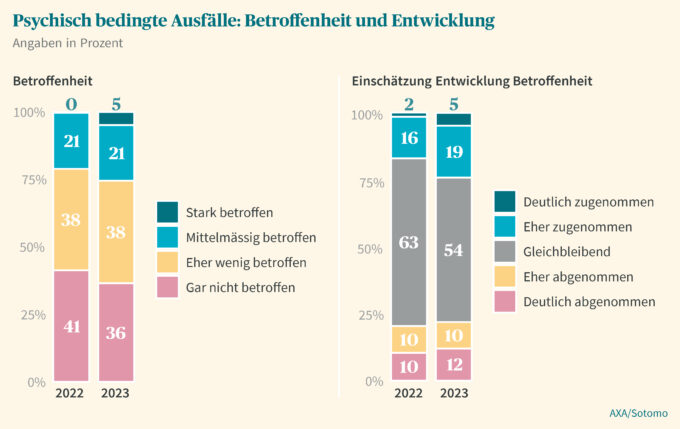64% of all SMEs are affected by mental health-related absences
Workplace absences severely affect SMEs. The AXA SME study shows: Absences due to mental illness are likely to increase even more in the future. And it's not just those affected who suffer, but also the rest of the workforce.

Absences from work due to mental health problems increased by 20 percent last year - a worrying record that the World Mental Health Day on October 10 should also draw attention to, as AXA writes on the occasion of its study. The Job Stress Index of Health Promotion Switzerland shows that more than 30 percent of employees feel emotionally exhausted. There are various reasons for this, believes Simon Weder, CEO WeCare and thus responsible for occupational health management in the corporate business at AXA Switzerland: "In addition to health, socio-political and social stress factors, the current shortage of labor also plays a role in workplace stress that should not be underestimated. If vacancies in a company cannot be filled, the pressure on existing employees rises sharply. The consequences of overload are often stress-related absences from work."
One in four SMEs strongly affected
As the study results of this year's labor market survey show, the proportion of those SMEs that were significantly affected by absenteeism due to mental illness in 2022 rose from 21 to 26 percent compared to the previous year, while the proportion not affected at all fell from 41 to 36 percent. Thus, only slightly more than one-third of the SMEs surveyed were not affected by mental health-related absences last year. This indicates that the problem of mental health has become even more acute.
According to the study, the proportion of respondents who believe that the frequency of absences due to mental health problems has increased over the last five years has also increased: For almost a quarter of SMEs (24% versus 17% in the previous year), absences have tended to increase or increased significantly, while slightly more than half estimate that absences have remained constant. However, as many as 22 percent of respondents also perceive a decline in the level of concern.
According to AXA, if employees are absent for a longer period of time, as is often the case in particular with psychologically induced illnesses, this leads to considerable financial and organizational costs for the company. SMEs in particular would suffer from this. As a direct effect of mentally induced absences, 54 percent of the SMEs surveyed cited an additional workload and overtime for the rest of the workforce in the first place. Since this additional workload can in turn exacerbate the problem, SMEs would do well to initiate preventive measures in advance to avoid mentally induced absences, says the CEO of WeCare. "A company health management system that is systematically anchored in the company as an overall concept helps to identify health risks at an early stage, to derive effective measures and accordingly to maintain and promote the health of employees in the long term."
Preventive measures mainly in the interpersonal area
The study results show that a large proportion of the SMEs surveyed are already active in this area. For the companies, the focus is on measures in the interpersonal area, such as creating a pleasant working atmosphere (42%) and promoting an open communication and feedback culture (38%). A good approach, Simon Weder is convinced: "A good working atmosphere promotes employees' willingness to perform and motivation. Healthy and motivated employees in turn cause fewer accidents and are less likely to be absent due to illness."
According to the study, around a quarter of the SMEs surveyed also pursue measures to improve the work-life balance of employees, and one in five companies conducts employee surveys. Only 15 percent of the companies surveyed say they do not pursue any prevention approaches. Yet these make a big difference, as Simon Weder explains: "Statistics show that companies that invest in the health of their employees save costs and sustainably increase their productivity."
Seismograph employee appraisal
According to AXA, an important instrument that can be used to anticipate employees' intentions to quit as well as psychological stress is the employee appraisal. To a certain extent, it serves as a seismograph for employee satisfaction. In slightly more than half of the SMEs surveyed in the study (56%), employee appraisals are institutionalized to the extent that they are part of the fixed tasks of supervisors - in large SMEs with over fifty employees, the figure is as high as 65 percent.
In over a third (39%) of the SMEs surveyed, however, employee appraisals were not firmly scheduled, but were either at the discretion of the line manager (23%) or only took place at the request of the employees (16%). Only a small proportion (5%) of the SMEs surveyed had not scheduled employee appraisals as a matter of principle. All in all, two out of five SMEs have the potential to plan employee appraisals as a precaution against the risk factors of staff turnover and psychological stress. "Regular employee appraisals make it easier to identify and systematically address mental stress. However, when it comes to recognizing mentally stressed individuals, managers often lack sensory awareness: unlike physical injuries, which are obvious, this requires particular sensitivity and confidence in dealing with them, so companies should invest in appropriate training. If employees also have strategies for effective stress management, phases of high stress in the workplace can be better managed," says Simon Weder.
To the study (Download here): For this study, the Sotomo research institute surveyed 301 Swiss SMEs with five or more employees from German- and French-speaking Switzerland. Data collection took place from February 21 to March 1, 2023 via the AmPuls company panel.









